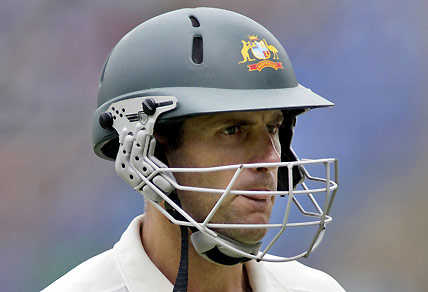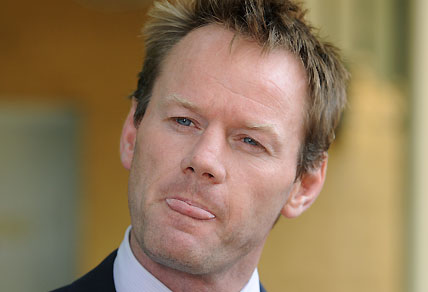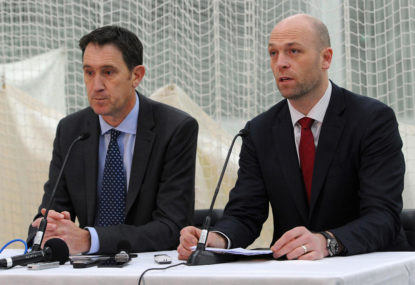It sometimes seems every five years or so some people involved in cricket try to blow up the sport, whether it’s World Series Cricket, or the South African rebel tours, or Shane Warne feeling bored, or matchfixers, or the IPL, or literally in the case of terrorists in Pakistan.
Australia’s most recent attempt was the pay dispute, one of the most pointless industrial fights in recent memory. After ten months of bad blood, including a strike (because the players actually went on strike, it wasn’t a threat, it happened) things have gone back to pretty much the way they were and the whole exercise was a massive waste of time, energy and money.
Not entirely, though. The one thing about battles, even pointless ones, is you find out who has grace under pressure and who doesn’t. Some people came out of the pay dispute extremely well. Others… not so much.
The winners
1) Alistair Nicholson
CEO of the ACA, who has ensured his job for life, or at least the next five years, as well as probably an ALP or (even Liberal Party) endorsement for a seat in parliament should he ever want to enter politics.
Nicholson handled himself with patience, decorum and skill, a text book case of good leadership – regularly consulting with his members and more experienced predecessors, not losing his cool, and resisting what must have been an overwhelming temptation to gloat during that final press conference with James Sutherland.
He’s not only given a good name to footballers being involved in cricket, but his success demonstrates once again that in battles between men with hair (James Sutherland, David Peever, Pat Howard), and men without (Nicholson) the bald will usually triumph because they will work harder.
2) Player unity
We’re normally used to reading articles about player feuds (Watto versus Clarke, Maxwell versus “the playing group”, etc) but this fight saw over 200 top level Australian cricketers, male and female all putting their careers on the line together and their solidarity felt pretty amazing.
I’m sure there were some hesitant members but there was no public talk of rebellion – even among players sometimes depicted (by their own Board too) as show ponies, like Shane Watson and Glenn Maxwell. And while yes some of the players are millionaires who could afford a few months off the bulk of the players weren’t, and this was especially admirable.
I think a new team unity is going to come out of this, especially respect for Steve Smith and Dave Warner. This could be the making of them both as captains.
(Mind you both Kim Hughes and Bill Lawry got the boot not long after sticking up for the players in disputes with the board so who knows?)
3) Independent cricket media
Independent cricket writers kept on top of their game throughout this dispute, hammering away with some excellent articles, even though like all of us they probably really wanted to be focusing on batting collapses in South Africa by the Australian A side.
There was some excellent journalism from the independent media, in sharp contrast to the party line toed by Cricket Australia’s media arm.
I am completely sympathetic to those journalists – they were really stuck between a rock and a hard place. Overall they did an OK-ish job of reporting on what was going on. But things kept sneaking in to articles all the time – like writing “(sic)” to highlight grammatical errors when reporting on the contents of Nicholson’s email to players or pointing out how Kevin Roberts is a life member of the ACA when he was fighting the ACA. And, inevitably, they were never going to go in too hard on Cricket Australia.
I think it’s great Cricket Australia have a media arm. I don’t think it justifies paying players less, but I think it’s good to have one. But the dispute reminded everyone of the importance of independent media voices in cricket (with a note of relief that the Murdoch family doesn’t seem to care that much about the sport).
4) Simon Katich
A great fighter for the players. More and more I’m coming to think that Katich is the great lost Australian cricket captain of the modern era.

. AP Photo/Aijaz Rahi
The losers
1) David Peever
I’m still at a loss as to what prompted Peever to push for this dispute. The past twenty years have been among the most tranquil in terms of board-player relations in Australian cricket history – certainly a lot more than, say, 1977-1997. The game is in solid financial health and is growing. Fans were happy – well, as happy as they were ever going to be – part of enjoying a sport is whingeing about it.
Why pick such a massive fight? And why pick a fight when players were more united than in any time in recent memory? At a time when they’ve never had more options to go and play somewhere other than Australia? To save a bit of money? To get a bit of extra power? To show everyone the benefit of having business people on the board?
And what possessed him to write that article in The Australian justifying his position? Did he honestly think it was going to help, complaining about people accusing him of pushing an industrial relations agenda during an industrial relations dispute? Or mentioning slavery?
Or having a swipe at the cricket media (“who should know better”) who disagreed with him? Or consistently going on about how “reasonable” his proposals were and how “insulting” the criticism was? I can’t understand any of it. What was his reasoning?
As an aside, are we ever going to find out how much money this dispute cost Cricket Australia in terms of salaries and expenses and lost income? Players get the boot after a big loss. Is this going to happen at Cricket Australia?
2) Kevin Roberts
A supposed successor to James Sutherland, Roberts headed the Cricket Australia negotiating team. By all accounts he’s a very capable business person.
Which is why I’m confused he did things like try to sneak past the ACA and talk to the players individually, even after the players asked them to deal with the ACA directly. Or starred in that video with all those bright colours and graphics to argue Cricket Australia’s position.
What did he think was going to happen? The players would talk to him and go “gee when you put it that way, I don’t want my revenue share any more?” Or “wow that video was fun, lets give up our hard-worn gains of twenty years”.
I totally get the desire of Cricket Australia to grab more power, but the way they went about it was so curiously ineffective. What was the thinking behind their tactics?
3) James Sutherland
Stayed out of the thing for months, then came in to help fix it up. He now looks really good in comparison to the rest of Cricket Australia but it’ll be hard to forget a lot of what he did, like complaining how that revenue sharing was an “outdated model” (“it’s done it’s job, don’t need it any more”), refusing to mediate because the other side didn’t want to negotiate, then demanding arbitration when things weren’t going his way.
Sutherland is the great survivor of Australian cricket so it would be foolish to count him out, but honestly after this fracas maybe it’s time to consider some fresh blood?
4) Pat Howard
I’ve already written about Pat Howard and my confusion over what his role is. After this dispute that confusion is as strong as ever. Howard did not cover himself in glory during the conflict – fumbling the pregnancy clause incident, scolding players for talking to the media, trying to get the top five cricketers to sell out their teammates by taking three-year contracts, scolding the players again for not reading the CA offer themselves (“your duty is to cricket”), “talking tough” by threatening players with a six-month ban if they engaged in unauthorised games (is that clause even legal?) and making threats about what sponsors they could use.

AAP Image/Dave Hunt
5) Michael Clarke
Michael Clarke’s actions during the dispute were also confusing. Generally sympathetic to the players, he arced up towards the end warning the players they’d be “silly” to not go into arbitration and get back on that field because “they can’t afford to miss one game of cricket”…
Did he not understand the issues at stake? Was he worried about his own commentating job? Did he genuinely believe playing some first class cricket was more important than sorting out the financial structure of the game for the next generation?
Clarke later amended his comments by tweeting he wanted the players to go to arbitration because he knew they would win – but that wouldn’t have been the case. The players could have lost. What possessed him to say that?
Michael Slater’s simplistic take on the dispute (“it’s all about money”) was no surprise to anyone who listens to his commentary. But Clarke’s was. It made me wonder, if Clarke had been Australian captain during this dispute, maybe things might have ended very differently.
There’s been talk since this dispute how we should forget all about it, focus on the cricket, and move on. But the players and people interested in good cricket administration should never forget what happened. Ever.
































































































